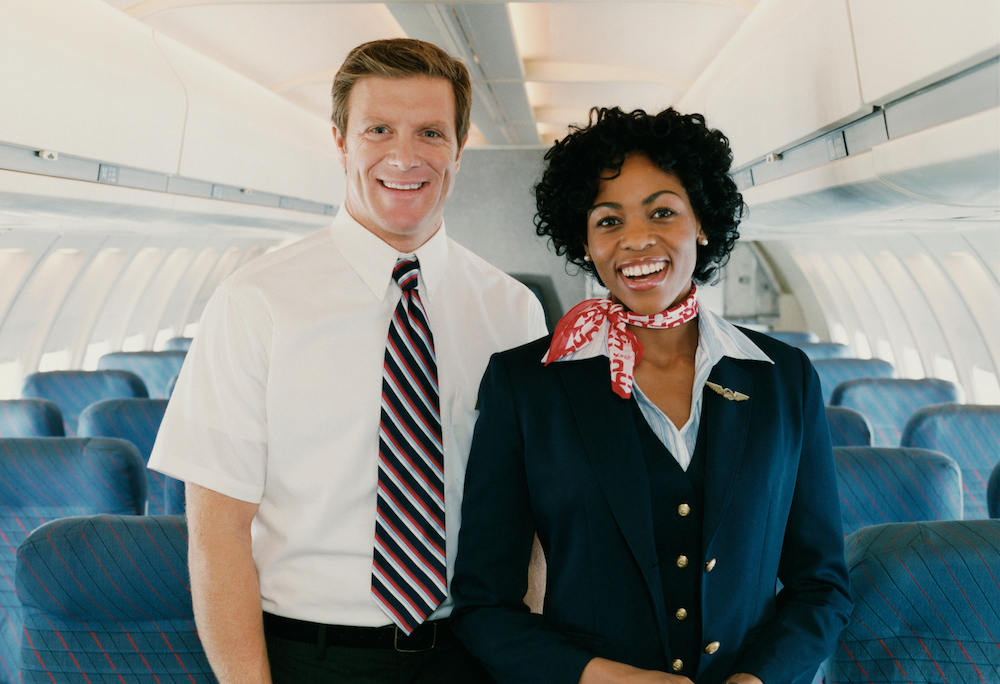Nas Lewis is the Black woman behind th|AIR|apy: a mental health non-profit for flight attendants.
She decided to apply for a position as a flight attendant because she needed a fresh start after going through one of the hardest things in her life at the time: a divorce.
“The first thing that my mind told me was that I had to go and leave, where I was, where I lived and just start over,” she told Travel Noire. “I never thought in my life that I would be a flight attendant. It was never a thought for me, but I went through the process, my airline hired me, and I fell in love with the profession.”
But Lewis will tell you whatever you’re running from will eventually catch up with you. She found herself hitting rock bottom in 2018 – a time when she had mommy guilt for choosing the profession she loved. Commuting to work was stressful, she wasn’t making a lot of money, and often wondered how people were surviving in the industry.
She pondered the idea of starting a support group in 2018 but ignored the thought. Then after the idea came to mind again in 2019, she decided to share her story.
“I wrote my story in September of that year and so many flight attendants came up to me and said, ‘I’ve been struggling, too,’ or ‘why didn’t you say anything to me?’ I learned so much from this group and realized how many of my colleagues were suffering silently and not saying anything,” said Lewis.
Lewis started th|AIR|apy at the end of 2019, which started as an online mental health resource for flight attendants and at the beginning of 2020, she went to therapy for the first time.
“Andrea Ford was her name. That woman saved my life. When I spoke to her, I felt like I was sitting by a stream of water and it was so peaceful.”
But then the pandemic came and life as we knew it completely shut down. It was a pivotal moment for th|AIR|apy.
“The airline industry tanked and by this time, I already had a website already with information out there for anyone needing a safe place to just talk about your mental health and just what you’re going through,” Lewis recalled. “But interest in the website grew as flight attendants— myself being one of them– were furloughed for six months. We were losing our minds. This organization became a safe place for flight attendants to feel supported to feel understood by the people who do this profession.”
The outreach wasn’t just from flight attendants domestically but internationally as well. It quickly became clear to Lewis that it was time to turn th|AIR|apy into a nonprofit and that’s what she did.
“I decided to turn it into a nonprofit, because, yes, a lot of corporations have EAP or what’s known as the Employee Assistance Program but when you call EAP they don’t know who you are other than you’re from whatever company. They don’t understand the profession.”
Th|AIR|apy is all about giving a voice to flight attendants’ mental health and speaking to the heart of travelers.
Bringing Awareness To Travelers
The FAA has reported some of its highest numbers of unruly passengers and Lewis realizes that her organization could not come at a better time.
She says it’s heartbreaking when she hears some of the stories about flight attendants being verbally and physically attacked and hopes th|AIR|apy can be a resource to passengers as well.
“Passengers think we’re there to give them a coke and a smile, and that doesn’t scratch the surface of what we do. We’re people, too,” said Lewis. “We’re coming home to our own issues that we have to turn it off on a flight even though we’re worried about our dying parents, even though we’re going through a divorce, even though we’re going to leave our kids behind. We have to turn all of those things off and say, ‘welcome aboard to XYZ flight.’’
She added, “when we are in the galley with the curtain closed it’s because we need a break, we need to decompress, we need a human moment to sit and eat dinner. But then, a passenger comes up to remove that curtain to shove trash in our face.”
As the airline industry struggles through the pandemic, including a staffing shortage, flight cancellations, and delays, Lewis is urging people to pack their compassion and patience.
“When we’re sitting at the gate and the door is open, we’re not getting paid for that, so if a flight is canceled or delayed, remember we go home with $0. Our clock does not start until the gate is closed.”
Lewis says the best thing for passengers to do is communicate with flight attendants if they’re having an issue and be mindful of displaced emotions.
“A lot of what happens onboard doesn’t just start on board, it starts outside. It starts at the reservation desk or on the phone. It starts when the TSA took your big bottle of lotion, and you’re not happy about that. Then you bring those emotions to the gate agent, and now you don’t like that you have to pay $25 to check your bag. Then you’re bringing those emotions on board and these displaced emotions are going from place to place until they finally reach a flight attendant who had nothing to do with that or even knows what’s going on.”
For more information about th|AIR|apy or to donate to the nonprofit, click here for the website.
And if you’re wondering how to show appreciation for flight attendants, thank you notes, a box of chocolates, and even small Starbucks gift cards they can use in the airport will go a long way.
